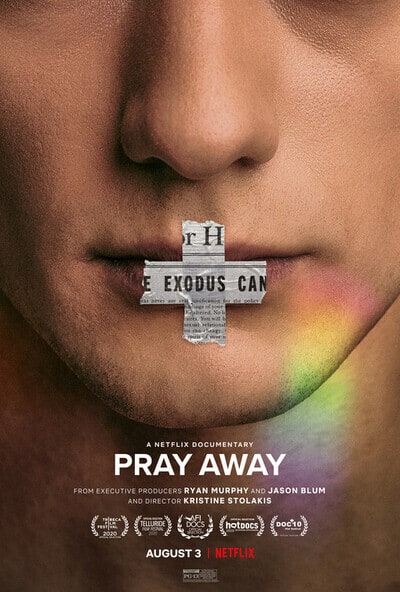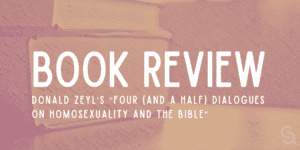 In these divided times, as many of us double down in our ideological camps, the new movie Pray Away (Netflix) offers a refreshing alternative by portraying people who not only realize they’ve been terribly wrong but who are also willing to admit it publicly.
In these divided times, as many of us double down in our ideological camps, the new movie Pray Away (Netflix) offers a refreshing alternative by portraying people who not only realize they’ve been terribly wrong but who are also willing to admit it publicly.
The filmmakers follow five people who strove to become “ex-gay” (i.e. change their gay orientation to heterosexual) and became leaders in the ex-gay movement. As each tells the story of how they eventually gave up on that project, it becomes evident that they all became victimized victimizers.
It is hard to admit being either, and it is bracing to see some of them tell that truth so plainly.
They are intelligent, charismatic, and articulate, so it’s easy to see why each of those interviewed became leaders in the ex-gay movement. Randy Thomas, former executive vice president of the umbrella ex-gay organization Exodus, says with stark vulnerability, “I have blood on my hands … I’m afraid to look down at my hands.”
John Paulk—who at one point represented the movement on the cover of Newsweek magazine with his arm around his now ex-wife Anne—reflects, “I had never been honest a day in my life. It was lie after lie after lie.” Julie Rodgers, who grew up in the movement (and has a new book out about it (Outlove: A Queer Christian Survival Story), says wryly, “I was a really good teenager … I just thought I was so bad!”
The movie follows these characters as they retrace their journey, each one a detective following hunches, gathering clues, and responding to their gut intelligence that something wasn’t right. For most of them there is a precise moment when it all came together in a terrible realization that they’ve been deceived and have been deceiving others.
In addition to the five ex-gay leaders, the movie also follows Jeffrey McCall, a devotee of the present-day, ex-gay group Freedom March. Here, the movie treads into complicated territory. Presumably McCall is included to show that the ex-gay movement continues and is a present danger. The opening scenes show him in front of a store assailing by-passers with an offer of prayer and a testimony (complete with a poster board of illustrative photos) of how he used to be transgender but how Jesus saved him from that. Even as a dedicated disciple of Jesus, I found McCall’s sales-pitch evangelism off-putting and cringe-worthy. It feels like a potent setup by the filmmaker to turn the audience (probably mostly cultured progressives) against ex-gays like McCall, and prepare them to accept the critiques of those who oppose ex-gay perspectives.
In his autobiography, For Such a Time: From Transgender to a Son of God, McCall shares that his first memory is of being abandoned by his parents and his second memory is of being sexually abused by a man. As might be expected, McCall went on to medicate his trauma with drugs, alcohol, and sex. He cut himself, struggled with eating disorders, and made suicidal gestures. McCall is a man who, drowning in a stormy sea, found a life-preserver in the form of a wooden cross. He interpreted the cross as meaning (among other things) that he must die to his life of addiction, sexual promiscuity, and his trans and gay identities.
The movie’s clear message is that McCall is harming others through his rejection of LGBT identities. That is, however, a reduction as people are so much more complicated than that. The uninhibited whirl of the sex-positive, anything-goes vibe among some on the affirming side can also result in destruction.
McCall offers people a basic, boot camp kind of Christianity. While I don’t know the details of his beliefs, a whole strain of charismatic Christianity exists that offers faith healings, promises of prosperity, and “deliverance” from LGBT identities. I worry about the deleterious effects of all those things, but if someone finds a life-preserver in such a faith, I’m reluctant to poke holes in it.
While I feel troubled by the way the movie uses McCall’s story, my own experience with conversion therapy makes me sympathetic to the movie’s overall message. At age 19, I attended the ex-gay group Desert Stream for a year. I fasted and prayed on Sundays and diligently tried to apply the group’s teachings in order to become straight. At the end of the year, a “graduation” ceremony was held, but I boycotted it, having realized that my orientation hadn’t changed and that the promise of becoming “ex-gay” was a lie.
But the experience prompted some important faith questions in me, among them “Is the promise of Christianity to make me normal?” I embarked on a long journey of trying to figure out who Jesus was. I thought a lot about the cross and ideas such as theologian Jurgan Moltmann’s assertion, in his book The Crucified God, that “at the centre of the Christian faith stands an unsuccessful, tormented Christ, dying in forsakenness.” I came to suspect that Jesus wasn’t primarily about making my self-improvement project work out.
The person of Christ is bandied about a lot by the interviewees in video clips from when they were speaking as ex-gay representatives. It is as if they were saying, “Yes, we know we’re asking people to this tough and possibly impossible thing. But we’re just trying to obey Jesus. We’re the ones trusting in his power, love, and healing.”
They were appealing to a moralistic, therapeutic Jesus who is not the Jesus of the Bible. True healing has happened for me as I’ve come to realize that Jesus isn’t a scolding judge, upset that I’m not clearing all the moral hurdles in the world. Rather, Jesus is love, and he invites me to partner with God—in the context of community—to serve and love God and others. To do so well requires moral discernment, but the motivation is trust rather than fear.
At one point, when I was struggling with faith, I asked a friend what helped him stay the course. He replied that Jesus continues to inspire him because Jesus went around “confronting the religious leaders of the day who used religion to justify injustice.”
Pray Away challenges religious leaders who unjustly claim, in the name of God, that everyone needs to be heterosexual. That claim fails to respect the diversity of God’s creatures and is spiritual malpractice.
In this sense, Pray Away is doing a profoundly Christ-like thing. It is challenging religious leaders (and here I’m thinking of people like Anne Paulk, Ricky Chelette, Andrew Comiskey, Robert Gagnon, Joseph Nicolosi, who unlike McCall don’t appear to have been drowning but make their living hawking the ex-gay brand—and people like those who founded the Changed Movement, of which McCall is a part) who unjustly claim, in the name of God, that everyone needs to be heterosexual. That claim fails to respect the diversity of God’s creatures and is spiritual malpractice.
Even so, I worry that for those who want it, this movie provides ammunition for those ready to condemn Christianity. At its worst, the meta-message of the movie might be something like, “Isn’t loving Jesus silly? It is so oppressive!” Certain Christians may feel rightly concerned about how the movie can be interpreted. And given the unfortunate inclusion of Jeffrey McCall, one could argue that this is another tiresome volley of the secular cultural creatives against the believing working class.
The movie justifies its mission with the claim that those who undergo conversion therapy are more likely to commit suicide. Studies like this one done at the UCLA School of Law show that LBG people who undergo conversion therapy are 75% more likely to plan a suicide attempt than those who don’t. While the study controls for adverse childhood events, one might still wonder if the study shows causation or mere correlation. In other words, do people contemplate suicide because they come from cultures hostile to LGBTQ identities (and thus secondarily seek out or are pressured into conversion therapy) or is it the conversion therapy itself that causes suicidal thoughts?
The answer matters, because if conversion therapy itself is the cause, then movies like Pray Away help consolidate political power to pass laws that outlaw conversion therapy and thus prevent suicide. If, however, the root problem is a culture of hostility toward LGBTQ identities, then movies like Pray Away may actually exacerbate the problem by shaming and rebuking the communities that hold to traditional norms. In response to a movie like Pray Away, such communities are likely to double down on their beliefs rather than moderate them.
In spite of my concerns that the movie portrays Christianity negatively, and may alienate the very communities it wants to convert, I still think it is worthwhile. Christianity, in its claim that we are sinners, predicts and expects religious malpractice. It also points the way to healing through confession and repentance. This is a movie about people doing exactly that. In these divided times, Pray Away is a helpful example of what repentant truth-telling might look like.
Tim Otto is author of Oriented to Faith: Transforming the Conflict over Gay Relationships, co-pastors an intentional Christian community in San Francisco, and can be followed @Tim_Otto.
Learn more about the film. And check out the discussion guide, mental health guide, legal and advocacy resources the filmmakers provide.


